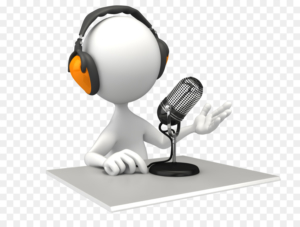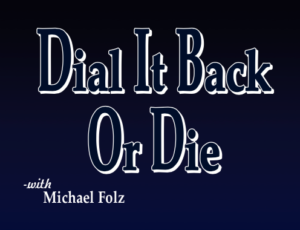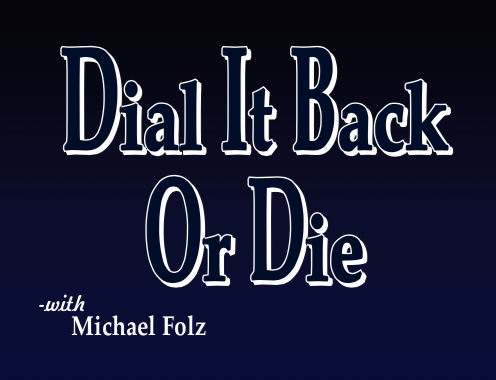Review: Dial It Back Or Die

As a podcast lover and as Editor of Yale1969.org, I notice when a classmate creates a podcast.
There was no surprise when we heard that Michael Medved had a podcast. Michael is a pro, of course … someone who has successfully navigated the modern media landscape for decades.
But what about us ordinary mortals? Did any other classmates actually record and publish their OWN podcasts?
Well, about a year ago, I discovered a podcast series written, recorded and published by Michael Folz, ’69 Pierson. I first met Michael when he contributed a beautifully written memoir to Yale1969.org — details about his first two years at Yale, up to the time he dropped out in ’67. (He eventually returned and graduated in ’73, but his YAA affiliation is with the Class of 1969.) In preparing that memoir for publication, Michael mentioned his podcast. I was curious. So, I subscribed.
Dial It Back Or Die
 The name of his podcast series is Dial It Back Or Die — a terrible name, IMHO, and one that doesn’t make any sense until you get far along into his argument; I’ll explain that later.
The name of his podcast series is Dial It Back Or Die — a terrible name, IMHO, and one that doesn’t make any sense until you get far along into his argument; I’ll explain that later.
Although this is a “podcast series,” it really is structured like a book, or maybe better described as a college course: It has a major thesis, which he introduces up front. It has major sections — History, Science and other “chunks,” each composed of several episodes, each of which covers what feels like a chapter in a book. And it’s best gone thru chronologically, starting with Episode 1.
The major thesis Folz advances is that the current disaster and dysfunction that we call Western, post-modern culture is a function of our embrace of ideas and ideals grounded in the Enlightenment and Utilitarianism … what he summarizes as “Liberal Democracy.” This refers generally to what the British call “classic Liberalism” — not to the “Liberal” vs. “Conservative” labels we used in the 60s.
The entire podcast series is worthy of close attention. Folz is a very broadly read guy and a serious and independent thinker. Dial It Back or Die is a sweeping look at 2500 years of human history and what’s now understood from the sciences … and he makes a compelling case that the belief structure of modern, Western thinking is just plain wrong.
As one who has based my whole world view of the Enlightenment ideas, ideals and freedoms I explored most deeply at Yale … and which I’ve tried to live ever since … I must say that I felt massive resistance and defensiveness when listening to the podcast. I didn’t want to go where I suspected Folz was taking me. I’m still on the intellectual journey he’s guiding, albeit nearing the apparent end of the series. And I still have the brakes on, although not hard enough to stop.

To be intellectually honest, I have to accept the points he makes from modern science (which he accurately summarizes and to which I am definitely committed as the basis for knowledge and truth). For example, there are many studies about gender differences that appear to be grounded in our very biology … and this directly contradicts the post-modern view that “gender” is merely a social construct. I believe in geneder equality as a principle, so I don’t want to accept any “scientific finding” that men and women are different in any way which might be used to oppress women (as they have been so often in history). But I also believe in science. So, what I found is that Dial It Back Or Die was causing me to a) think in more nuanced terms (and not simple good v. bad) about things like gender and b) stimulate me to “double click” on a few of his arguments to “learn more.”
For example, in the “history” sections, Folz takes the listener on an intellectual history tour of the major periods – Greek, Roman, Dark Ages, High Middle Ages, Renaissance, Reformation, Enlightenment, 19th century and 20th century “isms” and finally into the current “post-modern” world. I found these episodes very enlightening, with lots of material I didn’t know. (I was a B.S. undergrad and not deeply familiar with history.)
I imagined that Folz was one of those Directed Studies / Scholar of the House types whose minds operated best “where the rubber hits the sky.” Indeed, he does operate comfortably at higher levels of abstraction than I do (and ever did). But some of these episodes were grounded in stories and references that I had heard about, sort of, … but with a new twist. For example, his reports on how the Roman Empire failed and what really went on in the “Dark Ages” was new to me and very interesting. I felt like I was learning a lot … albeit drinking out of a fire hose. But I also felt skeptical … concerned that this was manipulating me … to induce me to believe something that was wasn’t really true — and something I was not going to like.
The same thing occurred in the science section, but here I knew a LOT more than I did in the history section. There, Folz accurately reported the science that I already knew, thereby gaining my trust in his reports on things like gender differences. And he makes some compelling arguments, e.g., that the Darwinian explanations for the origins of life are ridiculously improbable. I must say, I was persuaded by that, even though I didn’t want to be. I now believe that the probability that Life was an emergent property of underlying chemistry and physics is indistinguishable from zero. And I didn’t want to be persuaded, because that would challenge my present atheistic worldview. It’s much harder now for me to be confident that there is nothing beyond pure materialism.
 I’m not “done” … There are a few episodes left. I sense that he’s nearing the end, and I’m looking forward to how he synthesizes things. He certainly destroys “Liberal Democracy” as he has defined it. But what’s left in that rubble remains to be seen.
I’m not “done” … There are a few episodes left. I sense that he’s nearing the end, and I’m looking forward to how he synthesizes things. He certainly destroys “Liberal Democracy” as he has defined it. But what’s left in that rubble remains to be seen.
Even though the podcast made/makes me uncomfortable, I plan to finish it and to revisit some of the earlier episodes. First, I suspect that “Liberal Democracy” as Folz has defined it is a bit of a strawman. I’ll try to find a way to have my cake (current beliefs) and eat it too (be open to a new culture reflecting a higher consciousness and less suffering). I want to be sure that what is getting destroyed doesn’t open the gates to oppression of my grandchildren and their progeny.
I also want to revisit the History sections again to learn more and maybe scrutinize some of his points more closely; I suspect he’s wrong about some of those things, and I want to find that out, one way or the other. But I also want to see if his critique of Liberal Democracy is “creative destruction” that opens the way to a culture that conforms better to the need to live in an environmentally sustainable way and in the context of society better tuned to the hyper-social nature of human beings. Folz says that we are in a transition period from one consciousness (ego driven/survival oriented) to another, which may be more harmonious and better in ways we cannot currently fathom.
If you want to stretch your mind, I’d definitely recommend listening to the podcast (or reading the .pdfs of each chapter). You can listen online at Dial It Back Or Die.com or you can subscribe via Apple Podcasts here.

